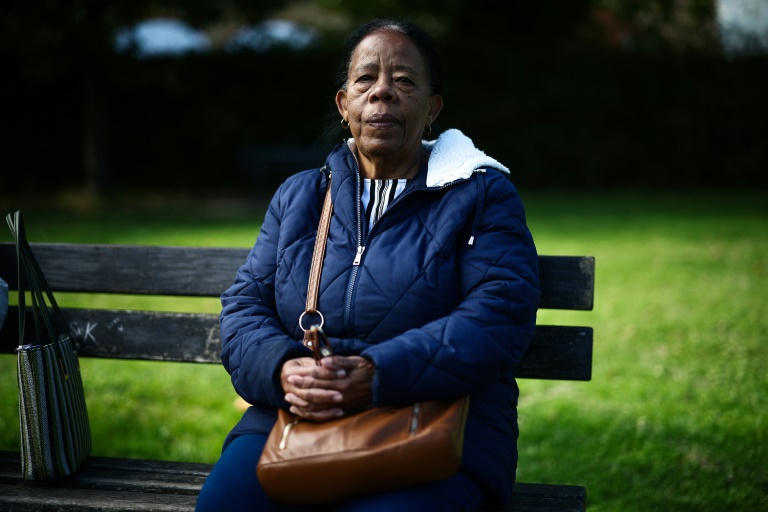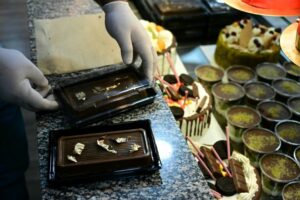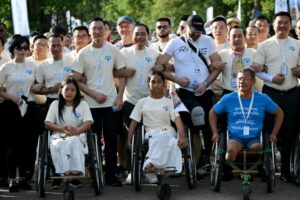Chagos diaspora angry at lack of input on islands’ fate

Raymonde Desiree, a member of the Chagossian community living in Crawley, south of London – Copyright AFP ANDREW CABALLERO-REYNOLDS
Marie HEUCLIN
Raymonde Desiree was 25 when she was forced to leave her native Chagos Islands as Britain emptied the Indian Ocean archipelago of its inhabitants to make way for a strategic military base.
Fifty-one years later, the petite matriarch says she, like many Chagossians living in Britain, is angry at not being given a say in the islands’ fate as they are now handed over to Mauritius.
Britain announced Thursday that it would transfer sovereignty of the remote archipelago but keep the joint American-British base on Diego Garcia island, an agreement US President Joe Biden hailed as “historic”.
But in Crawley, a town south of London that is home to a large Chagossian community, members of the diaspora described the announcement as the latest in a long line of injustices.
Desiree recalled giving birth to her first child on the boat that took her to the Seychelles from the Chagos Islands, as Britain emptied the archipelago of its inhabitants shortly after granting independence to Mauritius — but not the Chagos — in 1968.
From there, she was sent to Mauritius, where she “suffered”, especially from discrimination, she told AFP through an interpreter, speaking her native Creole.
Granted British citizenship, like the other roughly 2,000 Chagos inhabitants who were expelled, she eventually moved to Britain in 2004.
She said the new deal left her “saddened”.
“When I was born, the Chagos Islands weren’t under Mauritius,” she said.
“I will never be Mauritian,” said Jemmy Simon, 36, whose grandparents were among those expelled from the Chagos.
Despite her British passport, “I’m Chagossian,” she said.
“Going back to the Chagos Islands under Mauritian rule, that’s not going to happen. We were not consulted… They should have given us the right of self-determination.”
– ‘Uprooted’ –
The deal aims to put to rest half a century of legal battles over the islands.
It comes after the International Court of Justice recommended in 2019 that Britain hand them over.
During the hearings, Britain apologised for the “shameful” eviction of islanders. But it ignored the ICJ ruling at the time.
Under the agreement, members of the Chagossian diaspora will be allowed to return — though not to Diego Garcia, the largest of the archipelago’s roughly 50 islands.
But “that’s where my parents are from”, said Marilyn Ladouceur, 65, adding that the deal had left her “extremely angry”.
Born in Mauritius, she recalled an impoverished childhood there before moving to Britain in 2004.
The deal, she said, will turn the Chagos Islands “into another Mauritius”.
United Nations human rights chief Volker Turk on Friday urged Britain and Mauritius to make sure the ensuing treaty cementing the deal will “fully embrace human-rights driven solutions to the outstanding issues of remedy and reparation of the wrongs of the past”.
It should “enable the Chagossian people to return to their ancestral territories… (and) build sustainable and prosperous futures”, he said in a statement.
But beyond the difficulties of repopulating a remote archipelago and despite the promise of financial assistance under the deal, a return looks unlikely for many Chagossians now living in Britain.
Louis Vivian Marie, 72, said he had felt “uprooted” ever since leaving the islands at seven or eight years old.
“How can such a thing happen?” he says he still wonders.
But he says he plans to stay in Britain with his Mauritius-born wife, who is applying for British citizenship.
Desiree, meanwhile, has abandoned her dream of returning.
“I’m too old,” she said, adding she was also unsure in what kind of condition she would find her long-deserted island.
Chagos diaspora angry at lack of input on islands’ fate
#Chagos #diaspora #angry #lack #input #islands #fate





